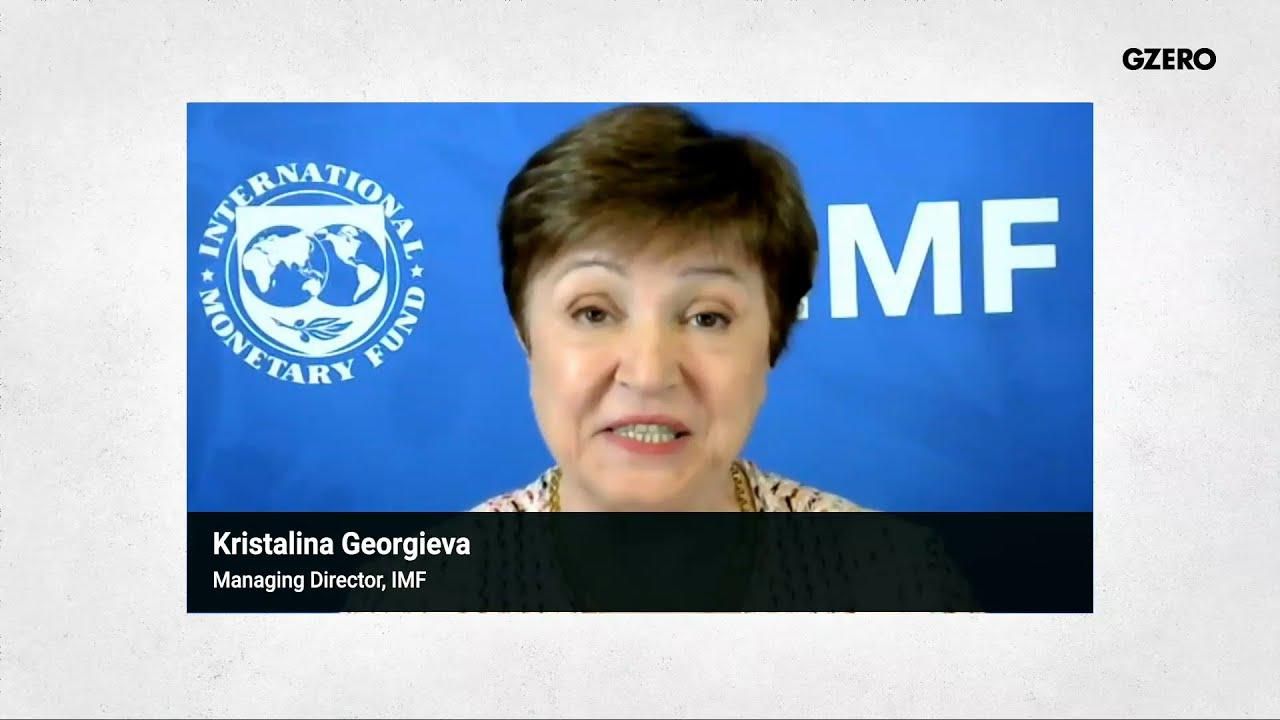For IMF Managing Director Kristalina Georgieva (above), a two-track pandemic means a two-track recovery that'll hurt the entire world in the long run. That's why she anticipates G7 leaders meeting this week will commit to sending about one billion doses of COVID vaccines to the developing world by the end of the year in new financing and shots unused by wealthy nations. Georgieva hopes it'll be a summit that gives all countries "a fair short in the arm, a fair shot at the future."
Georgieva was one of many experts who joined this week's two-part livestream discussion about post-pandemic health security hosted by GZERO Media in partnership with Flagship Pioneering, Beyond the Pandemic: A Radical New Approach to Health Security, presented in partnership with Flagship Pioneering.
This year's G7 meeting comes at the right time for its members to start thinking together about how to prevent the next pandemic, says UK Secretary of State for Health and Social Care Matt Hancock. Part of that conversation, in his view, should focus on how to reform the World Health Organization so it can quickly — and independently — act when the next new pathogen emerges.
Why has the much-touted COVAX global facility failed to deliver on its promise of equitable distribution of COVID vaccines despite big pledges from rich nations and multilateral organizations like the IMF? "Don't commit to what you cannot achieve," says Agnes Binagwaho, Vice Chancellor at the University of Global Health Equity, who calls out top Western donors for often not walking the talk on commitments — unlike China and India.
When will we need COVID vaccine boosters against new variants? Probably before the fall, according to Moderna CEO Stéphane Bancel. And what about IP waivers? He says they are not the solution, and could have negative unintended consequences like stifling future investment in innovative technologies that allowed vaccines to be developed in record time.
Why is the US not investing huge amounts in health security for Americans and the rest of the world? For Ian Bremmer, the government sees value in spending big on national security or tech to counter China, but less so in bolstering our defenses against public health threats. If this continues, he warns, America will be as ill-prepared for the next pandemic as it was for COVID.
Watch key moments from the first part of this series on June 8, "Beyond the Pandemic: A Radical New Approach to Health Security,"
This live event series is produced by GZERO Media in partnership with Flagship Pioneering. We thank our event partners, Partnership for a Healthier America and Medtronic.
- Biden goes to Europe, but is America really “back”? - GZERO Media ›
- Hard Numbers: Pakistan's train wreck, G7 global tax agreement ... ›
- How will we deal with the next pandemic? - GZERO Media ›
- What We're Watching: Tanzania's new leader, big global economic ... ›
- Expect Biden's first European trip to drive concrete steps with G7, EU - GZERO Media ›
- Expect Biden's first European trip to drive concrete steps with G7, EU - GZERO Media ›
- Biden's vaccine diplomacy and US global leadership; US-China bill gets bipartisan support - GZERO Media ›
- Biden & G7 take on China - GZERO Media ›
- Biden and G7 take on China - GZERO Media ›
- You can clone your pet - GZERO Media ›
- A GZERO pandemic - GZERO Media ›
More For You
In this Quick Take, Ian Bremmer weighs in on the politicization of the Olympics after comments by Team USA freestyle skier Hunter Hess sparked backlash about patriotism and national representation.
Most Popular
100 million: The number of people expected to watch the Super Bowl halftime performance with Bad Bunny, the Puerto Rican superstar and newly minted Album of the Year winner at the Grammys.
Brazilian skiers, American ICE agents, Israeli bobsledders – this is just a smattering of the fascinating characters that will be present at this year’s Winter Olympics. Yet the focus will be a different country, one that isn’t formally competing: Russia.
What We’re Watching: Big week for elections, US and China make trade deals, Suicide bombing in Pakistan
Japanese Prime Minister Sanae Takaichi, president of the Liberal Democratic Party (LDP), appeals for a candidate during a street speech of the House of Representatives Election Campaign in Shintomi Town, Miyazaki Prefecture on February 6, 2026. The Lower House election will feature voting and counting on February 8th.
Japanese voters head to the polls on Sunday in a snap election for the national legislature’s lower house, called just three months into Prime Minister Sanae Takaichi’s tenure.
